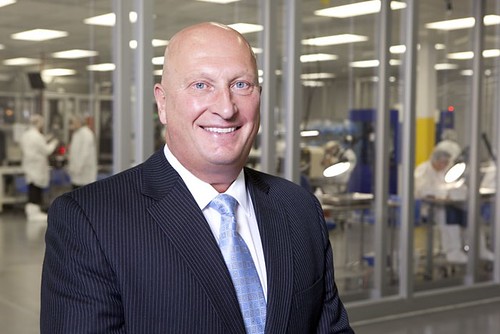
Alan Shortall recently hosted Deputy Secretary Kathleen Merrigan and a White House Business Council roundtable at his company’s headquarters in York, Penn. Alan’s company, Unilife, was the recipient of a USDA Business and Industry Guaranteed Loan. His story is proof that public and business sectors can work together to bring about change in rural America.
I was recently honored to host a roundtable discussion between the White House Business Council and local business leaders from York, PA. This meeting and similar roundtable discussions now taking place across the country are an excellent initiative by the Obama Administration as it provides a direct line of communication between employers from across the U.S and senior members of the Federal Government.
These are the types of discussions that will help identify and correct barriers to the creation of jobs, improving the global competitiveness of the U.S. and attracting international investment.
In addition to fairly typical requests such as a more efficient tax code, better R&D incentives and less red tape, what I found most striking from the roundtable discussion in York was the universal desire amongst both business leaders and government officials to reinvigorate the American manufacturing industry.
Ever since the industrial revolution, manufacturing has been the backbone of the U.S. economy. But with the media full of news about facilities being closed and companies outsourcing production to countries such as China, many are questioning the future of manufacturing in the U.S.
I believe the U.S. can not only maintain its position as the global leader for manufacturing…but enhance its lead. It all comes down to our capacity for innovation, as this is the engine that drives our economy.
The U.S. deserves its global reputation as the place where good ideas are created, funded and made. It is the unique blend of human knowledge, financial capital and operational capabilities that is interwoven into American society that makes this the perfect environment to attract those with the innovative products and ideas that will redefine the future.
It was this culture of innovation that attracted my company, Unilife - an emerging global leader in the market for advanced drug delivery systems - to re-domicile its business from Australia to the U.S in 2008. And it was why Unilife relocated its production activities from Shanghai, China to a new state-of-the-art facility York, PA. The U.S. production of Unilife’s innovative products such as Unifill®, the world’s first prefilled syringe with integrated safety features, means they are sold to pharmaceutical customers with a level of quality and reliability that encapsulates the ‘Made in the USA’ message on the package.
Our decision to relocate to the U.S. has been validated by our success since 2008. Since then, we have doubled in size every year and attracted a number of top-tier pharmaceutical companies to our door seeking our help to address their unmet needs for device innovation.
Unilife thanks America for its support to-date.
However if other emerging global industry leaders are to make a similar decision to Unilife and invest in the U.S, it is vital they have access to employees, infrastructure and incentives that are ahead of the curve. Above all, we must enhance our capacity to bring innovative new technologies to market with a level of speed, agility and quality that is unparalleled.
For this to occur, the U.S. must not only maintain but expand its investment in programs that can re-invigorate the productivity of the local manufacturing industry and re-skill our workforce for the needs of tomorrow. Furthermore, ongoing efforts by the Obama Administration to simplify these programs and eliminate the obstructive red-tape need to be vigorously supported.
When you consider that only 1% of U.S. companies currently export, only a small improvement to our competitiveness as a global innovator can deliver substantial outcomes in terms of jobs and economic growth.
